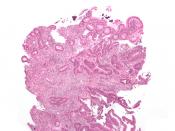Anemia is common in cancer patients and is associated with reduced survival. Recent studies document that treatment of anemia with blood transfusion in cancer patients is associated with increased infection risk, tumor recurrence, and mortality. We therefore investigated the incidence of preoperative anemia in colorectal cancer and assessed risk factors for anemia. Prospective data were collected on 311 patients diagnosed with colorectal cancer over a 6-year period from 1994 through 1999. Patients were stratified by age, gender, presenting complaint, preoperative hematocrit, American Joint Committee on Cancer (AJCC) stage, and TNM classification. Discrete variables were compared using Pearson's Chi-square analysis. Continuous variables were compared using Student's t test. Differences were considered significant when P < 0.05. The mean age of the study cohort was 67 ñ 9.2 with 98 per cent of the study population being male. The mean AJCC stage was 2.2 ñ 1.2 and the mean preoperative hematocrit was 35 ñ 7.9
with an incidence of 46.1 per cent. The most common presenting complaints were hematochezia (n = 59), anemia (n = 51), heme-occult-positive stool (n = 33), bowel obstruction (n = 26), abdominal pain (n = 21), and palpable mass (n = 13). Preoperative anemia was most common in patients with right colon cancer with an incidence of 57.6 per cent followed by left colon cancer (42.2%) and rectal cancer (29.8%). Patients with right colon cancer had significantly lower preoperative hematocrits compared with left colon cancer (33 ñ 8.5 vs 36 ñ 7.4; P < 0.01) and rectal cancer (33 ñ 8.5 vs 38ñ6.0; P < 0.0001). Patients with right colon cancer also had significantly increased stage at presentation compared with left colon cancer (2.3 ñ 1.3 vs 2.1 ñ 1.2; P < 0.02). Age was not a significant risk factor for preoperative anemia in colorectal...


